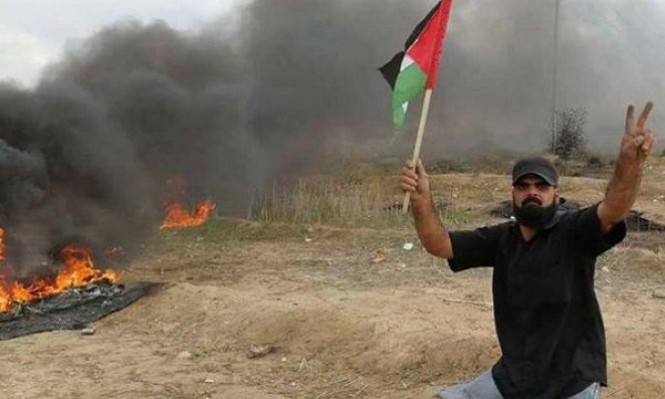
Ref: 72/2019
The Palestinian Center for Human Rights (PCHR) strongly condemns the Israeli Military Prosecution’s decision to close without prosecution the case of Ibrahim Nayef Abu Thorayah, a person with disability who was killed by the Israeli snipers along the eastern Gaza Strip borders on 15 December 2017.
The office of the Israeli forces’ Spokesperson said that the military police investigated with the soldiers and commanders who witnessed the incident and examined the videos documenting it; however, no evidence was found to assure that Abu Thorayah was killed directly with a bullet fired by the Israeli forces.
According to PCHR’s investigations, Abu Thoraya, who was a double amputee and wheelchair-bound, was shot directly in the head during a peaceful demonstration while he was about 30 meters away from the border fence. Abu Thorayah was completely visible to the Israeli soldiers and did not pose any threat to the life of the Israeli soldiers. Moreover, his injury in the forehead indicates that he was deliberately sniped by the Israeli soldiers, without posing any danger to their lives during a demonstration, which is based only on chanting, throwing stones and burning tires. This also emphasizes that the Israeli forces used lethal and disproportionate firepower against unarmed civilians.
The Israeli forces use excessive force against the Palestinian civilians participating in the peaceful demonstrations of the Great March of Return and Breaking the Siege since 30 March 2018, along the eastern borders of the Gaza Strip. As a result, 206 Palestinians were killed and about 12,500 others were wounded in similar circumstances of Abu Thorayah’s killing. The International Commission of Inquiry established on 18 May 2018 to investigate these violations confirmed the Palestinian human rights organizations’ conclusion which indicates that the Israeli forces used lethal force against the demonstrators, who neither posed an imminent threat to the life of the Israeli soldiers nor were directly involved in hostilities, in violation of the international human rights law rules.
It should be mentioned that PCHR filed a criminal complaint relevant to the killing of Abu Thorayah and provided important evidence to the Israeli authorities in this regard. The Israeli prosecution demanded to obtain the bullet that caused the death of Abu Thorayah, and PCHR tried hard to obtain it from the competent authorities in Gaza. However, the latter refused so, constituting a pretext for the Israeli authorities to evade their obligations and take this as a justification for closing the case.
PCHR believes that the closure of the investigation into Abu Thorayah’s case proves Israel’s policy when dealing with the Palestinian victims and demonstrates Israel’s systematic violations of its international legal obligations. Moreover, closing the investigation constitutes disavowal of the international law that would never continue without the full legal and political immunity granted to Israel by the international community.
PCHR believes that this incident, as a symbolic case, unequivocally confirms the black record of the Israeli judicial system in dealing with the Palestinian victims that has been documented in thousands of other cases. In this context, thousands of victims of three military offensives launched by Israel on the Gaza Strip within six years are still awaiting justice in light of Israel’s denial of their rights.
Israel’s systematic denial of justice before the Israeli Judiciary, which systematically provides cover for widespread violations of international law in the occupied Palestinian territory, underscores an urgent need to resort to the international criminal justice mechanisms, including the International Criminal Court and the exercise of the universal jurisdiction principle, despite the enormous obstacles facing the international justice.